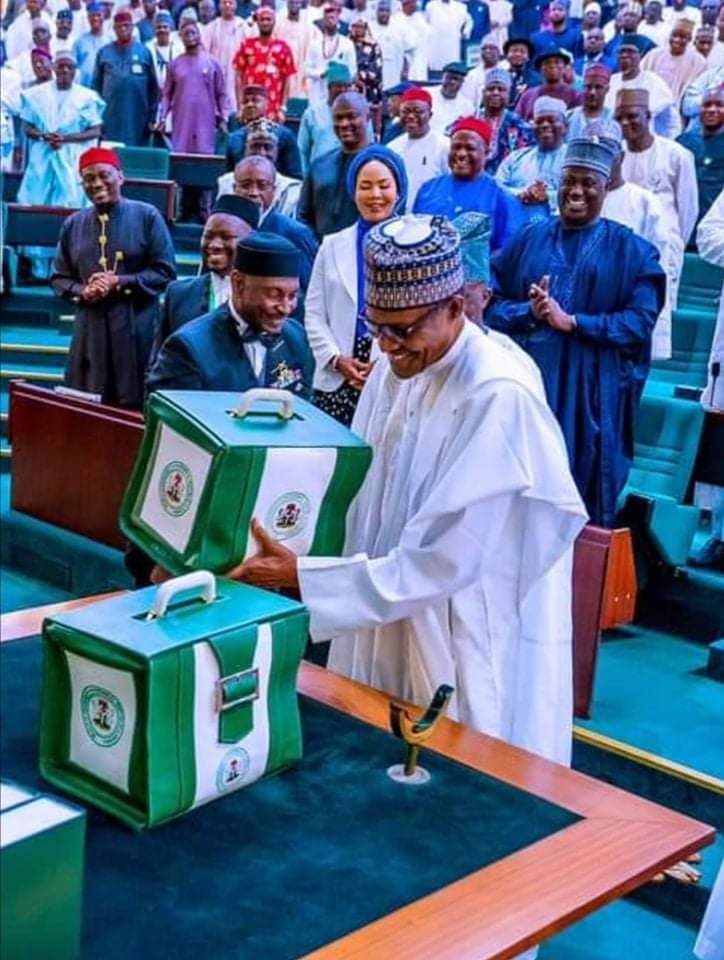
President Muhammadu Buhari on Thursday said his administration has been borrowing to finance the budget due to dwindling revenues.
He urged Nigerians to be alive to their tax obligations as taxation is a required sacrifice for citizens if the country is to develop.
The President spoke virtually during the First National Tax Dialogue held at the Conference Hall of the State House in Abuja.
He tasked the Federal Inland Revenue Services (FIRS) and other relevant agencies to explore all standard practices to boost revenue.
According to him, the FIRS must ensure to plug all revenue leakages by ensuring strict tax payments by foreign companies operating in Nigeria.
He called for the deployment of more digital platforms and seamless connections.
President Buhari said having to borrow to augment the budget to fund urgently-required projects had increased the nation’s debt profile to N32 trillion as at last September.
The President said the government had “inevitably resorted to deficit budgeting as a result of declining revenues for some years,’’ resulting to increase in Nigeria’s debt profile.
“As we might expect, this has led to an increase in Nigeria’s debt profile which stood at about N32 trillion in September 2020.
“This funding gap created by the dwindling government revenue therefore underscores the importance of the national tax dialogue we are holding today.
“No nation has ever made progress without having to pay for it or make the necessary sacrifice. I, therefore, call on all Nigerians to be alive to their tax obligations.
“This government is strategically restructuring the tax revenue mix in favour of indirect taxes in accordance with our national tax policy document.
“To this end, FIRS is mandated to do all that is required in order to efficiently collect tax revenue due from transactions carried out using local and foreign online platforms.
“The government has made a relevant statutory amendment to tax laws in the Finance Act 2020,” he said.
The President also ordered all government agencies to automate operations and ensure more synergy in advancing the interest of the nation in revenue generation.
He said: “It is not enough that our citizens and local businesses pay their fair share of taxes. Equally, foreign businesses must also not be allowed to continue to exploit our markets and economy without paying appropriate taxes.
“Accordingly, the FIRS has my mandate to speedily put all measures in place to fully implement programmes to stamp out Base Erosion and Profit Shifting in all their ramifications and generally automate its tax processes.
“In line with this, I have directed all government agencies and business enterprises to grant FIRS access to their systems for a seamless connection.
“FIRS must ensure that its deployment of technology for automation is done in line with international best practices.
“In particular, FIRS can borrow a leaf from other countries which have successfully automated their tax processes.”
President Buhari said necessary amendments had been made to the FIRS Establishment Act in the Finance Act 2020 in order to provide the legislative framework for the adoption of technology in tax administration.
Minister of Finance, Zainab Shamsuna Ahmed, said the government will improve its template for tax collection, especially in the face of dwindling revenues due to the coronavirus pandemic, describing 2021 as a year of recovery for the economy.
She noted that emphasis on tax collection will be shifted from income to spending and all multinational corporations in the country will be required to fully comply with new directives.
The FIRS Chairman, Muhammad Mamman Nami, for a comprehensive tax payment culture.
He underscored the importance of the dialogue, saying: “The universal collapse of traditional government revenue sources and the consequential resort to tax is a testimony. “
Nami stressed that the FIRS would match on to digitalise the tax process fully and called for support.
His words: “The FIRS started the journey to automation several years ago when it launched ‘Project Fact’.
“Several other initiatives were launched to further take advantage of evolving technology in taxpayer registration, online payment platforms, remote filing of returns, etc.
“However, there was a very limited success with the various initiatives due to inadequate statutory framework.
“A quantum leap was achieved with the 2020 Finance Act which copiously provided legal grounds for the deployment of technology in tax administration.”
By Bolaji Ogundele and Nduka Chiejina











